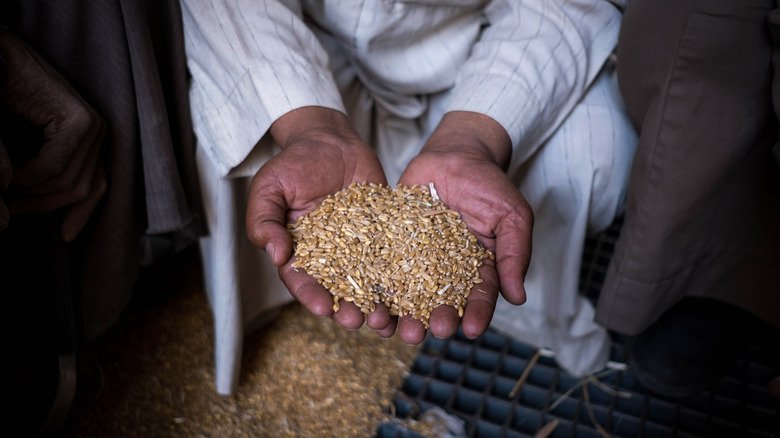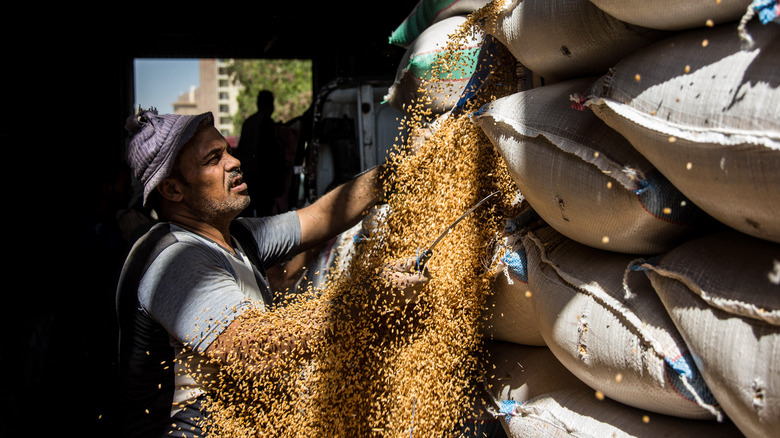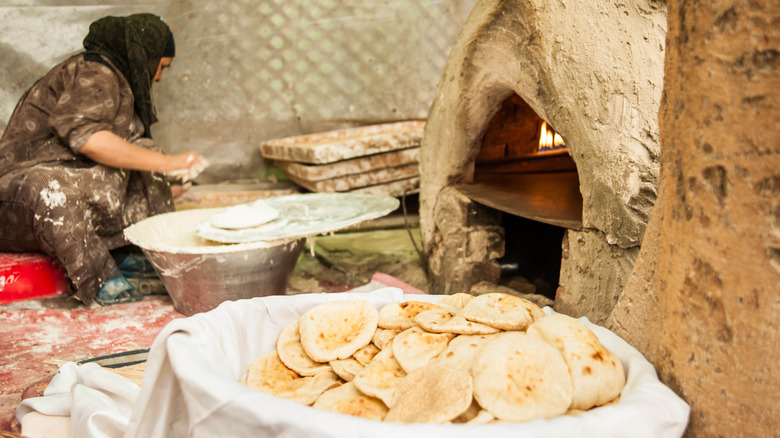The World Bank Is Loaning Egypt $500 Million For Wheat. Here's Why
As global wheat shortages loom larger, the world's preeminent financial institution is lending a helping hand to one of the nations hit hardest by the wheat crisis (via CBS News). In recent months, wheat prices have skyrocketed worldwide as a result of the ongoing Russian invasion of Ukraine, global economic inflation, and major climate catastrophes.
Together, Russia and Ukraine produce about a third of the world's total wheat supply. Large portions of those supplies –particularly wheat grown and exported by Ukraine, which has had its seaports, roads, and trains obstructed by the Russian military in recent months — have been halted since February, when the conflict between the two nations began (via The New York Times).
Although Russia has denied responsibility for the global food crisis, most experts agree that worldwide grain shortages caused by the invasion have led to mass price increases and food shortages, with some nations hit harder than others, including Egypt. Earlier this year, the Egyptian government enacted a new law to ensure that 60% of its native grain crops would stay within Egypt's borders and began cracking down on grain smugglers found transporting wheat outside of the country (via The National). However, locally grown crops only provide a small portion of the country's total annual wheat usage.
Egypt is the world's largest importers of wheat
Egypt is the largest wheat importer in the world, purchasing millions of tons of wheat annually, according to World Grain. In 2021, Egypt imported around 80% of that wheat from Ukraine and Russia. Although the embattled nation has recently made attempts to expand its wheat import sources — including signing a new contract to purchase 180,000 metric tons of wheat from India just this week — the country is still struggling to keep up with demand (via Reuters).
Each year, approximately 70 million Egyptians rely on government-subsidized bread to feed themselves and their families (via the Associated Press). Subsidized bread is crucial to feeding the impoverished masses of Egypt, which make up a third of the country's over 100 million citizens (via Borgen Project).
In recent months, the Egyptian government has struggled to finance the nation's massive wheat intake due to the sharply elevated wheat prices. Earlier this week, Egyptian leadership announced that it would be reducing its annual wheat imports by 10% (equivalent to about 500,000 tons) as a response to the rising costs (via Bloomberg). However, the country still plans on importing 5.5 million tons of grains to keep up with demand.
According to the Associated Press, to counteract the economic pressure put on the Egyptian government, the World Bank — which recently issued a dire prediction regarding the escalation of the ongoing global food crisis — pledged a $500 million loan to Egypt to finance the nation's wheat purchases.
The funds are part of a sweeping global action plan
"This emergency operation comes at a very critical juncture when the food security of many countries is threatened by the war in Ukraine," said Marina Wes, World Bank Country Director for Egypt, to the Associated Press. The global financial institution noted that the funds should be used to create subsidized bread for the nation's most vulnerable households.
The World Bank's half-billion-dollar loan to the Middle Eastern nation is part of the IFI (International Financial Institutions) Action Plan to Address Food Insecurity. This plan was developed at a meeting of the World Bank, International Monetary Fund, and European Bank for Reconstruction and Development last month (via Reuters).
The sweeping plan, which will be funded by a group of financial institutions, pledged to provide aid to nations struggling with food insecurity and poverty through a variety of programs. "The Russian war against Ukraine is the latest global shock that is exacerbating the sharp increase in both acute and chronic food insecurity in recent years driven by conflict, climate change and economic downturns," the U.S. Treasury wrote in a release. "The IFIs are working swiftly to bring to bear their financing, policy engagement, technical assistance, and knowledge work to address rising food insecurity." Egypt is just one of the many nations that will benefit from the plan over the coming year, with hopes that the country will be able to support its most vulnerable citizens one loaf at a time.


